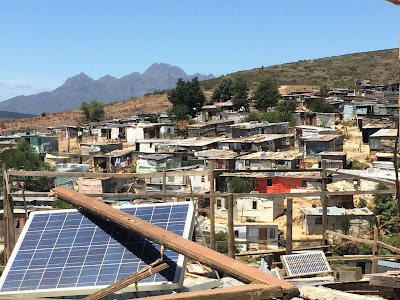Innovation mythology
Innovation is a big buzz word in South Africa at the moment. Stellenbosch, the 2nd oldest town in SA, has claimed the title of South Africa's innovation capital. Innovation seminars are happening all over the place, with plenty of exclamation marks. And squadrons of innovation gurus are jetted in to share with us their secrets to accelerating innovation. In corporate SA, you ain't on point if your tongue ain't talking innovation.
And it is all tragically anti-innovation. Stellenbosch is the least innovative place, and the most unequal. The maths is clear. And the emptiness of it all is clear - desperate attempts by the old guard to keep themselves relevant by using what they perceive to be the language of the day. It's quite a circus to watch, those chinos and old school tie brigades slapping each other on the back with craft lager in the other hand, keeping things exactly as they have always been.
The real innovation hub of Cape Town, I think, is the R310 corridor, bending slightly to start with the Philippi Village, taking in Khayelitsha, iThemba Labs, the Lynedoch Eco Village and ending with the iShack project in Enkanini, Stellenbosch. Along this corridor we have a winery producing wines from grapes grown in township backyards; a solar geyser project in Kuyasa that has transformed a set of communities; an entrepreneur delivering chronic medication by bike to the elderly and the frail; a government facility treating cancer with particle radiotherapy, for free; a residential village that is home to all layers of economic, racial and linguistic diversity, with its own sewerage works and a pending set of wild experiments in photovoltaic (PV) energy with Eskom; and a project putting PV on shack rooftops. All of these projects in some way have been born out of a plan to address inequality.
The only real way to start innovation, is to accelerate social justice, and radically reduce inequality. When society reaches far greater levels of social equilibrium, where opportunity is not a byproduct of your privilege, that is where innovation will happen on a massive scale, without any pushing or cajoling or innovation summits.
In South Africa, there are no shortages of good ideas that can bring about innovation, in so many sectors. And they mostly come from the least financially fluid spaces, the least formally educated spaces. When these pockets of creative rigour access financial and social capital, the potential for those ideas to gain mainstream traction is huge, and massive leaps in innovation will occur.
All of our efforts should be toward that goal, and anything that distracts us from that goal should be pushed aside.



Comments
Post a Comment